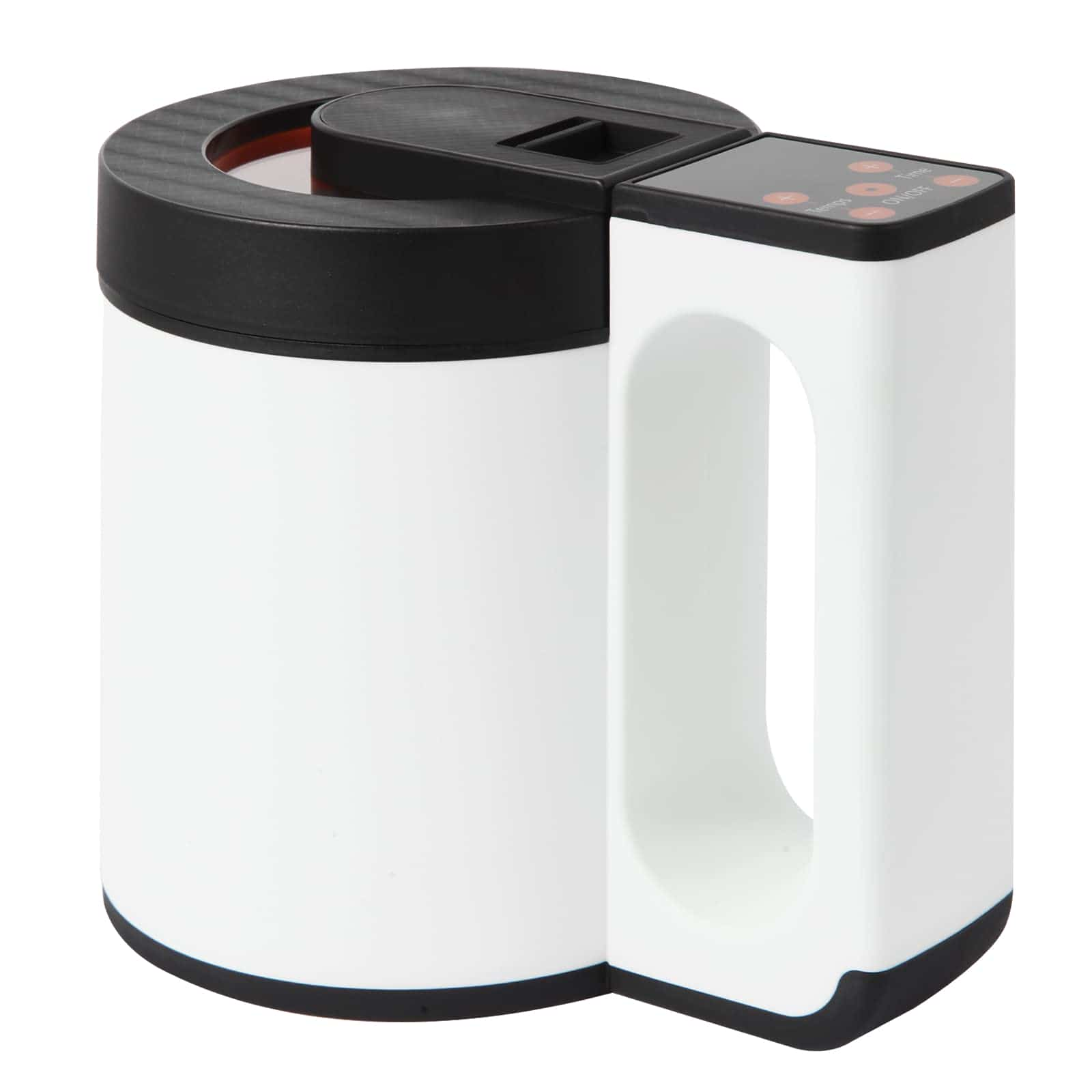Turmeric Tea
What Tea Is Good For Crohn’s Disease

As someone who has been living with Crohn’s Disease for several years, I understand the struggles that come with managing the symptoms of this chronic illness. From abdominal pain and diarrhea to fatigue and malnutrition, Crohn’s can significantly impact one’s quality of life.
While there is no cure for Crohn’s Disease, there are various strategies that can help alleviate its symptoms and improve one’s overall well-being. One such strategy is incorporating tea into your diet, as certain types of tea have been found to have anti-inflammatory and antioxidant properties that can benefit those with Crohn’s.
In this article, I will explore the health benefits of tea, the different types of tea available, and the research that has been conducted on tea and Crohn’s Disease. I will also share which types of tea are best for managing Crohn’s symptoms and how to prepare them.
Additionally, I will discuss the precautions that should be taken when drinking tea and other lifestyle changes that can help manage Crohn’s Disease. By the end of this article, you will have a better understanding of how tea can be a beneficial addition to your Crohn’s management plan.
Key Takeaways
- Different types of tea, including black, green, white, and oolong tea, can help alleviate symptoms and improve overall well-being for those with Crohn’s disease.
- Studies suggest that drinking green tea can significantly reduce inflammation in the gut of Crohn’s disease patients.
- Chamomile, peppermint, ginger, fennel, and turmeric tea are beneficial for Crohn’s disease.
- Precautions should be taken when drinking tea, such as considering caffeine sensitivity and potential interactions with medications. Dietary modifications and stress management techniques can complement the benefits of tea and other medications in managing Crohn’s disease.
Overview of Crohn’s Disease
If you’re curious about Crohn’s disease, let’s take a quick look at what it is and how it affects the body.
Crohn’s disease is a type of inflammatory bowel disease (IBD) that can affect any part of the digestive tract, from the mouth to the anus. The exact cause of Crohn’s disease is unknown, but it’s believed to be the result of a combination of genetic and environmental factors.
Common symptoms of Crohn’s disease include abdominal pain, diarrhea, fatigue, rectal bleeding, and weight loss. There’s no cure for Crohn’s disease, but there are treatment options and medications that can help manage symptoms and prevent complications.
The goal of treatment is to reduce inflammation in the digestive tract and alleviate symptoms. Medications such as anti-inflammatory drugs, immunosuppressants, and antibiotics can be used to achieve this. In severe cases, surgery may be necessary to remove damaged portions of the digestive tract.
With that said, there are natural ways to alleviate symptoms of Crohn’s disease, such as drinking tea.
Health Benefits of Tea
You’ll be surprised to know that drinking a cup of tea every day can reduce your risk of heart disease by 20%. Tea, especially green tea, is rich in antioxidants that help protect your cells from damage caused by free radicals. These antioxidants may also help reduce inflammation in the body, which is beneficial for those with Crohn’s disease.
If you’re a coffee lover, don’t worry! You don’t have to give up your beloved cup of joe completely. However, incorporating tea into your daily routine can have significant health benefits. Here are a few reasons why tea is a great substitute for coffee:
- Tea contains less caffeine than coffee, which can help reduce anxiety and jitters.
- Tea is a natural source of L-theanine, an amino acid that promotes relaxation and reduces stress.
- Tea is available in a variety of flavors and types, making it easy to find one that suits your taste preferences.
In addition to its benefits for those with Crohn’s disease, tea is a great beverage choice for anyone looking to improve their overall health.
In the next section, we’ll explore the different types of tea and their unique health benefits.
Types of Tea
I’m excited to talk about the different types of tea and their unique characteristics.
Black tea, with its bold flavor and high caffeine content, is a great pick-me-up in the morning.
Green tea, known for its health benefits, is a light and refreshing option that can be enjoyed throughout the day.
White tea, the least processed of all teas, has a delicate flavor and is rich in antioxidants.
Finally, oolong tea, with its partially oxidized leaves, offers a complex flavor profile that’s perfect for those who enjoy a more sophisticated taste.
Black Tea
Black tea can be a delicious and potentially helpful option for individuals with Crohn’s disease. It’s a type of tea that’s fully oxidized, resulting in a stronger flavor than other tea varieties.
Black tea contains compounds called theaflavins and catechins, which have anti-inflammatory properties. These compounds may help reduce inflammation in the gut, which is a common problem for individuals with Crohn’s disease.
In addition, black tea has other health benefits, such as improving heart health and reducing the risk of certain types of cancer. However, it’s important to note that black tea also contains caffeine, which can be a trigger for some individuals with Crohn’s disease.
As with any dietary change, it’s important to consult with a healthcare provider before incorporating black tea into your diet.
Next, we’ll discuss green tea and its potential benefits for individuals with Crohn’s disease.
Green Tea
One potential option for individuals with Crohn’s disease is green tea, which has been found to have anti-inflammatory properties and may help reduce inflammation in the gut. Green tea contains a compound called epigallocatechin-3-gallate (EGCG), which has been shown to have anti-inflammatory effects. Additionally, the antioxidants in green tea can help protect the body from damage caused by free radicals.
If you’re considering incorporating green tea into your daily routine, here are some potential discussion ideas to consider:
- Benefits: Green tea may have anti-inflammatory properties, may help reduce the risk of developing colorectal cancer, and contains antioxidants.
- Drawbacks: Green tea contains caffeine, which may aggravate symptoms in some individuals.
- How to incorporate into a daily routine: Try swapping out your morning coffee for a cup of green tea, or enjoy a cup in the afternoon as a mid-day pick-me-up.
- Recommended dosage: There’s no set recommended dosage for green tea, but it’s generally recommended to stay within moderate levels of consumption.
- Potential interaction with medications: Green tea may interact with certain medications, so it’s important to speak with your healthcare provider before adding it to your routine.
Moving on to the next subtopic, white tea also has potential benefits for those with Crohn’s disease.
White Tea
White tea, known for its delicate flavor and high levels of antioxidants, has the potential to alleviate symptoms of inflammatory conditions like Crohn’s disease. The antioxidants found in white tea are called catechins, and they’ve been shown to reduce inflammation in the body.
In addition, white tea contains polyphenols which have been found to have anti-inflammatory effects as well. These benefits make white tea a great choice for those with Crohn’s disease who are looking for a natural way to manage their symptoms.
When brewing white tea, it’s important to use water that isn’t too hot, as boiling water can damage the delicate flavor and nutrients in the tea. A temperature of 170-180°F is ideal for brewing white tea.
Steeping time should also be kept short, around 2-3 minutes, to prevent the tea from becoming too bitter. By brewing white tea properly, you can enjoy its full range of health benefits and delicate flavor.
Moving on to the next topic, oolong tea has been shown to have potential benefits for those with Crohn’s disease as well.
Oolong Tea
If you’re looking for a flavorful option with potential health benefits, oolong tea might be your cup of choice, as it’s been known to soothe your digestive system like a gentle breeze on a warm day.
Originating in China, oolong tea is made from partially fermented tea leaves and has a unique taste that falls between green tea and black tea. It’s been enjoyed for centuries and has been said to provide numerous health benefits.
Here are four interesting facts about oolong tea:
- Oolong tea has been associated with weight loss due to its ability to increase metabolism and burn fat.
- The fermentation process of oolong tea may help relieve symptoms of digestive disorders such as Crohn’s disease.
- Oolong tea contains antioxidants that may help reduce the risk of chronic diseases such as heart disease and cancer.
- The caffeine and theanine in oolong tea may help improve brain function and increase alertness.
Research on tea and Crohn’s disease is still ongoing, but the potential health benefits of oolong tea make it a great option for those with digestive issues.
Research on Tea and Crohn’s Disease
You’ll be pleased to know that studies suggest drinking green tea may help reduce inflammation in the gut and alleviate symptoms of Crohn’s disease.
In fact, a clinical trial conducted in Japan found that drinking green tea for 12 weeks significantly reduced inflammation in the gut of Crohn’s disease patients.
Additionally, a study published in the Journal of Gastroenterology and Hepatology found that green tea polyphenols (compounds with antioxidant properties) can modulate the gut microbiome, which plays a crucial role in the development of inflammatory bowel disease.
Comparing tea and traditional Crohn’s disease treatments, it’s important to note that while tea may help alleviate symptoms, it should not be used as a sole treatment for Crohn’s disease. Rather, it can be used in conjunction with medication and lifestyle changes to manage symptoms.
In the next section, we’ll dive into the best tea options for individuals with Crohn’s disease.
Best Tea for Crohn’s Disease
For a soothing and gentle option to help ease your gut discomfort, sipping on a warm cup of tea can be like a comforting hug for your insides. When it comes to Crohn’s disease, there are a variety of herbal alternatives that can be beneficial. Chamomile tea is a popular option for its anti-inflammatory properties and ability to calm the digestive system. Peppermint tea is another favorite, as it can help alleviate symptoms such as bloating and gas. Other teas that have been known to help with Crohn’s include ginger, fennel, and turmeric tea.
To help you choose the best tea for your symptoms, below is a table outlining the benefits of each tea and brewing techniques to ensure maximum effectiveness. Remember, it is important to consult with your healthcare provider before incorporating any new remedies into your treatment plan.
| Tea | Benefits | Brewing Technique |
|---|---|---|
| Chamomile | Anti-inflammatory, Calming | Steep 1-2 teaspoons in hot water for 5-10 minutes |
| Peppermint | Alleviates bloating and gas | Steep 1-2 teaspoons in hot water for 5-10 minutes |
| Ginger | Anti-inflammatory, Calming | Add 1-2 teaspoons of grated ginger to hot water and let steep for 10-15 minutes |
| Fennel | Alleviates bloating and gas | Steep 1-2 teaspoons in hot water for 5-10 minutes |
| Turmeric | Anti-inflammatory | Add 1-2 teaspoons of turmeric powder to hot water and let steep for 5-10 minutes |
Now that you know the benefits and brewing techniques of each tea, the next section will discuss how to prepare tea to ensure the best results for your gut health.
How to Prepare Tea
When it comes to preparing tea, there are a few key factors to consider in order to get the perfect cup.
Firstly, it’s important to choose the right tea leaves for your desired taste and health benefits.
Secondly, brewing temperature and time can greatly affect the flavor and strength of your brew.
Finally, adding honey or lemon can enhance the taste and provide additional health benefits.
By considering these factors, you can create a delicious and healthy cup of tea.
Choosing the Right Tea Leaves
If you’re looking to choose tea leaves that can potentially alleviate symptoms of Crohn’s disease, it’s important to consider the specific types of tea and their potential benefits. Here are a few things to keep in mind when selecting the right tea leaves:
-
Look for teas with anti-inflammatory properties. These teas can reduce inflammation in the gut, which is especially important for those with Crohn’s disease. Green tea, white tea, and oolong tea are all good options.
-
Consider the tea flavor. Since Crohn’s disease can affect the taste buds, it’s important to choose a tea that you enjoy drinking. Some people find that fruity or floral teas are more palatable than strong, bitter teas.
-
Choose high-quality tea leaves. Lower quality tea leaves may be contaminated with pesticides or other harmful substances, which can aggravate Crohn’s disease symptoms. Look for organic and/or fair-trade options.
-
Experiment with different types of tea. Everyone’s body is different, so what works for one person may not work for another. Don’t be afraid to try different types of tea to see what works best for you.
When it comes to choosing tea leaves for Crohn’s disease, it’s all about finding a balance between taste and health benefits. Once you’ve selected the right tea leaves, it’s time to move on to the next step: brewing temperature and time.
Brewing Temperature and Time
To get the most out of your chosen tea leaves, make sure to adjust the brewing temperature and time according to your preference. Brewing equipment also plays a role in the quality of your tea. Using high-quality equipment can enhance the taste and aroma of your tea.
When it comes to brewing temperature and time, it’s important to find the right balance. Steeping tea for too long can result in a bitter taste, while steeping it for too short a time can result in a weak flavor. The table below provides a general guide for brewing temperatures and times for different types of tea. Keep in mind that these are just guidelines, and you should adjust them based on your personal preference.
| Type of Tea | Water Temperature | Brewing Time |
|---|---|---|
| Green | 160-180°F | 1-3 minutes |
| White | 170-185°F | 2-3 minutes |
| Oolong | 190-200°F | 3-5 minutes |
| Black | 200-212°F | 3-5 minutes |
Adjusting the brewing temperature and time can make a significant difference in the taste and quality of your tea. Once you’ve brewed your tea to your liking, you may want to add honey or lemon to enhance the flavor.
Adding Honey or Lemon
Enhance the flavor of your brew by adding a touch of honey or a squeeze of lemon, creating a deliciously sweet and tangy taste. Not only do these additions add depth to your tea, but they also have potential health benefits for those with Crohn’s disease.
Here are a few benefits of honey and lemon alternatives for Crohn’s disease:
- Honey has antibacterial and anti-inflammatory properties that may help soothe inflammation in the gut.
- Lemon contains vitamin C, which can help boost the immune system and reduce inflammation.
- Adding lemon to tea can also help aid in digestion by increasing the production of stomach acid.
- Honey and lemon together can help soothe a sore throat and alleviate coughing.
- For those who cannot tolerate honey, maple syrup can be used as a substitute for its anti-inflammatory properties.
Incorporating these simple additions to your tea not only enhances the flavor but also provides potential health benefits for those with Crohn’s disease. As we move forward, let’s discuss how to incorporate tea into your diet in a sustainable and enjoyable way.
Incorporating Tea into Your Diet
Incorporating tea into your diet is a simple and enjoyable way to boost your overall health and well-being. Not only is tea brewing easy, but there are also countless tea flavors to choose from to suit your taste buds.
From green tea to herbal tea, there is a tea for everyone. When it comes to Crohn’s disease, certain teas may be more beneficial than others. For instance, chamomile tea has anti-inflammatory properties that may help reduce inflammation in the gut. Peppermint tea may also help soothe stomach discomfort and reduce bloating.
However, it’s important to note that not all teas may be suitable for everyone with Crohn’s disease. Therefore, it’s important to consult with your doctor or a registered dietitian before incorporating tea into your diet.
Precautions When Drinking Tea
As someone who enjoys drinking tea on a regular basis, it’s important to be aware of potential precautions when consuming this beverage.
For individuals with caffeine sensitivity, it’s important to monitor their intake as some teas can contain high amounts of caffeine.
Additionally, certain teas may interact with medications and it’s important to consult with a healthcare provider before consuming them.
By being mindful of these precautions, tea can be enjoyed safely and without any adverse effects.
Caffeine Sensitivity
While it might be tempting to reach for a cup of coffee or black tea, individuals with Crohn’s disease who are sensitive to caffeine may want to consider caffeine alternatives. Caffeine can act as a stimulant and increase bowel movements, which can worsen symptoms of Crohn’s disease.
Some caffeine alternatives include herbal teas, such as peppermint, chamomile, and ginger, which have anti-inflammatory properties and can help soothe the digestive tract. Additionally, decaffeinated teas or those with lower amounts of caffeine, such as green tea or white tea, may be better tolerated by those with Crohn’s disease.
Managing caffeine intake is important for individuals with Crohn’s disease, as excessive caffeine consumption can lead to dehydration and interfere with medication absorption. It’s recommended to limit caffeine intake to no more than 400mg per day, which is equivalent to about 4 cups of coffee.
It’s important to note that caffeine sensitivity can vary from person to person, so it’s best to listen to your body and adjust accordingly. By incorporating caffeine alternatives and managing caffeine intake, individuals with Crohn’s disease can help alleviate symptoms and improve their overall quality of life.
In addition to caffeine sensitivity, it’s important to consider how tea and other beverages may interact with medications used to treat Crohn’s disease.
Interactions with Medications
Be cautious of how other beverages may interact with your medication, as it could potentially worsen your symptoms and hinder your progress towards healing. While tea may have many potential benefits for Crohn’s disease, it’s important to be aware of any potential risks or interactions with your current medications.
Some teas contain compounds that can affect the way your body absorbs or metabolizes medication, which can lead to negative side effects or reduced effectiveness. When incorporating tea into your Crohn’s disease management plan, it’s important to discuss dosage recommendations and potential interactions with your healthcare provider. They can help you determine which teas may be beneficial for your specific condition and medications, as well as any precautions you need to take to avoid potential negative interactions.
By being mindful of how tea may interact with your medications, you can safely incorporate this beverage into your Crohn’s disease management plan and potentially experience its many benefits. Furthermore, there are other lifestyle changes that can also help manage Crohn’s disease. These changes include dietary modifications and stress management techniques, which can complement the benefits of tea and other medications.
Other Lifestyle Changes to Manage Crohn’s Disease
When managing my Crohn’s disease, I’ve found that making lifestyle changes beyond just drinking tea can be incredibly helpful.
Three key areas that I focus on are diet and nutrition, stress management, and exercise.
By paying attention to what I eat, finding ways to reduce stress, and incorporating regular physical activity into my routine, I’ve been able to better manage my symptoms and improve my overall quality of life.
Diet and Nutrition
To manage my Crohn’s disease, I focus on eating a balanced diet that includes plenty of fruits, vegetables, lean proteins, and whole grains. Nutritional recommendations for Crohn’s disease include avoiding trigger foods like dairy, spicy foods, and high-fat foods. I also make sure to stay hydrated by drinking plenty of water throughout the day.
Incorporating green tea into my diet has also been shown to help reduce inflammation and improve gut health. Green tea contains antioxidants called catechins that have anti-inflammatory properties. Additionally, green tea has been found to promote the growth of good gut bacteria, which can help improve digestion and overall gut health.
By paying attention to my diet and incorporating green tea, I can better manage my Crohn’s disease and improve my quality of life. Transitioning into the subsequent section about stress management, it’s also important to remember that stress can also play a role in Crohn’s disease symptoms.
Stress Management
One way I’ve found helpful in managing my Crohn’s disease symptoms is by taking steps to reduce stress in my daily life. Stress can exacerbate symptoms and trigger flare-ups, so finding ways to relax and unwind is crucial.
Some techniques that have worked for me include practicing meditation, deep breathing exercises, and progressive muscle relaxation. Meditation techniques can help focus the mind and reduce anxiety, which can, in turn, help alleviate stress. There are many different types of meditation, so it’s important to find one that works for you.
Deep breathing exercises involve taking slow, deep breaths to calm the body and mind. This can be done anywhere, anytime, and is a quick and easy way to reduce stress. Progressive muscle relaxation involves tensing and then relaxing different muscle groups, which can help release tension and promote relaxation.
By incorporating these techniques into my daily routine, I’ve found that my stress levels have decreased, and my Crohn’s disease symptoms have improved.
Reducing stress is just one aspect of managing Crohn’s disease. Another important step is incorporating exercise into your routine.
Exercise
Incorporating regular exercise into your routine can be a game-changer for managing Crohn’s symptoms. Not only does it help improve digestion, but it also reduces inflammation and boosts overall health and well-being.
One form of exercise that’s been particularly beneficial for individuals with Crohn’s disease is yoga. The benefits of yoga for Crohn’s patients are numerous.
Yoga helps to reduce stress and anxiety, which can trigger symptoms. In addition, yoga postures can improve digestion and circulation, which can help alleviate symptoms such as bloating and constipation.
It’s important to note that rest is also a crucial component of managing Crohn’s disease. Incorporating yoga into your routine can provide both physical activity and relaxation, making it a great addition to a Crohn’s management plan.
Frequently Asked Questions
What are the common symptoms of Crohn’s disease and how can they be managed?
As someone with Crohn’s disease, I manage my symptoms through dietary recommendations and medications. Common symptoms include abdominal pain, diarrhea, and fatigue. Working closely with a healthcare provider is important for effective management.
Are there any foods or beverages that should be avoided when managing Crohn’s disease?
As someone managing Crohn’s disease, it’s important to be mindful of dietary restrictions and avoid trigger foods. Certain foods like spicy or high-fiber foods may exacerbate symptoms. It’s best to work with a healthcare provider or registered dietitian to create a personalized plan.
Can tea be used as a substitute for medical treatment in managing Crohn’s disease?
Tea cannot be used as a substitute for medical treatment in managing Crohn’s disease. While tea may offer some benefits, it does not compare to the effectiveness of medication prescribed by a healthcare professional.
How can stress and anxiety affect Crohn’s disease and what can be done to manage them?
Stress and anxiety can worsen Crohn’s disease symptoms. To manage them, I practice breathing exercises and meditation techniques. Evidence suggests they can reduce inflammation and improve quality of life. I prioritize stress management alongside medical treatment.
Are there any alternative therapies or remedies that can be used in conjunction with tea to manage Crohn’s disease?
Oh, sure. Because when I think of managing my Crohn’s disease, the first thing that comes to mind is herbal remedies and acupuncture. But, in all seriousness, some studies suggest that these alternative therapies can be helpful in conjunction with traditional treatments.
Conclusion
So, what tea is good for Crohn’s Disease?
After researching the topic, I’ve found that green tea and chamomile tea are the best options. Both teas have anti-inflammatory properties that can help reduce symptoms of Crohn’s Disease.
However, it’s important to note that tea shouldn’t be used as a replacement for prescribed medication or treatment. Incorporating tea into your diet can be a simple and enjoyable way to manage symptoms of Crohn’s Disease.
By preparing and drinking tea regularly, you can potentially reduce inflammation and discomfort in your digestive system. So, why not give it a try? Who knows, a cup of tea may just be the natural remedy you’ve been looking for.
Noah, the Editor-in-Chief at Cappuccino Oracle, plays a pivotal role in shaping the voice and vision of our renowned platform. With an unwavering passion for coffee, coffee alternatives, and tea, Noah leads Cappuccino Oracle towards new horizons in the realm of coffee journalism.
Beyond his professional responsibilities, Noah serves as a mentor and guiding force for his team. His dedication to journalistic excellence and genuine love for coffee, coffee alternatives, and tea continue to inspire and motivate the Cappuccino Oracle family. In the ever-evolving world of these beverages, Noah’s leadership ensures that our platform remains at the forefront, delivering enlightening and enjoyable content to our readers worldwide.
Turmeric Tea
What Kombucha Tea Is Good for Gerd

As someone who deals with GERD, I understand the challenge of finding effective natural remedies. I was excited to find out about how **kombucha tea** could help alleviate GERD symptoms. If you want to learn more about this natural remedy, keep reading!
In this article, we’ll explore the science behind how kombucha tea can soothe GERD and offer relief. We’ll also discuss how to choose the right kombucha tea and ways to incorporate it into your GERD diet.
Get ready to brew some delicious and potentially soothing kombucha tea for your GERD!
Key Takeaways
- Kombucha tea can relieve symptoms of GERD, such as heartburn and acid reflux.
- Choosing the right kombucha tea for GERD relief involves considering soothing flavors like ginger, lemon, and chamomile, as well as low sugar and minimal added ingredients.
- Kombucha tea soothes GERD symptoms by balancing stomach acidity, reducing acid reflux, and improving digestion with its beneficial bacteria and enzymes.
- When incorporating kombucha tea into a GERD diet, it is important to monitor its effects on symptoms, consider individual responses, and take into account factors such as acidity levels, sugar content, and personal tolerance.
The Benefits of Kombucha Tea for GERD
Kombucha tea can help relieve symptoms of GERD, such as heartburn and acid reflux. The benefits of consuming kombucha tea for GERD are supported by its health effects on the digestive system.
Kombucha is a fermented beverage that contains probiotics, which are beneficial bacteria that promote gut health. These probiotics can help restore the balance of bacteria in the digestive tract, reducing symptoms of GERD.
Additionally, kombucha tea is a natural source of organic acids, such as acetic acid and gluconic acid, which can help regulate stomach acidity and prevent the excessive production of stomach acid that leads to heartburn and acid reflux.
Overall, incorporating kombucha tea into your diet can have positive effects on GERD symptoms and improve your overall digestive health.
Choosing the Right Kombucha Tea for GERD Relief
When selecting the right option, make sure to consider the flavors and ingredients that may aggravate your GERD symptoms. It’s important to find kombucha flavors that are soothing and gentle on the digestive system. Some flavors that are known to provide relief for GERD sufferers include ginger, lemon, and chamomile. These flavors have anti-inflammatory properties and can help soothe the lining of the esophagus. When looking for kombucha brands, it’s best to choose ones that are low in sugar and have a minimal amount of added ingredients. Some popular brands that cater to GERD sufferers include GT’s Living Foods, Health-Ade, and Brew Dr. Kombucha. These brands offer a variety of flavors that are suitable for individuals with GERD.
| Brand | Flavors for GERD Relief |
|---|---|
| GT’s Living Foods | Ginger, Lemon |
| Health-Ade | Ginger, Lemon |
| Brew Dr. Kombucha | Ginger, Chamomile |
| Synergy | Ginger, Lemon |
| Kevita | Lemon, Chamomile |
How Kombucha Tea Can Soothe GERD Symptoms
If you’re struggling with GERD, it’s worth exploring how kombucha can provide relief for your symptoms.
Kombucha tea is known for its many health benefits, including its potential to soothe GERD symptoms. The fermentation process of kombucha produces organic acids, such as acetic acid and gluconic acid, which can help balance the pH levels in the stomach and reduce acid reflux.
Additionally, kombucha contains beneficial bacteria and enzymes that can improve digestion and promote a healthy gut.
To make kombucha tea at home, you’ll need a SCOBY (symbiotic culture of bacteria and yeast), black or green tea, sugar, and filtered water. Simply brew the tea, add sugar, cool it down, and let the SCOBY ferment the mixture for about 7-14 days.
Enjoy your homemade kombucha tea and potentially find relief for your GERD symptoms.
Incorporating Kombucha Tea Into Your GERD Diet
To incorporate it into your GERD diet, try drinking kombucha in small amounts and monitoring how it affects your symptoms. Kombucha tea can play a role in managing GERD symptoms due to its potential beneficial effects on gut health. However, it is important to note that individual responses may vary, so it is essential to listen to your body and adjust accordingly. Here is a table outlining the potential benefits and considerations of incorporating kombucha tea into your GERD diet:
| Potential Benefits | Considerations |
|---|---|
| Probiotic properties | Acidity levels |
| Antioxidant content | Sugar content |
| Potential anti-inflammatory effects | Caffeine content |
| Improved digestion | Personal tolerance |
| Hydration | Quality and safety of the tea |
Incorporating kombucha tea into your GERD diet can be a personal choice based on your individual needs and preferences. It is always recommended to consult with a healthcare professional or registered dietitian before making any significant changes to your diet.
Tips for Brewing Kombucha Tea for GERD Relief
Brewing kombucha at home can be a cost-effective way to customize the flavors and control the ingredients for your GERD relief.
When it comes to brewing techniques, it’s important to follow proper sanitation practices to prevent contamination. Start by brewing a batch of black or green tea, then add sugar and a SCOBY (Symbiotic Culture of Bacteria and Yeast).
Fermentation typically takes around 7-14 days, but it’s essential to taste-test regularly to achieve the desired acidity. To enhance the flavor of your kombucha for GERD relief, consider incorporating ingredients like ginger or chamomile, known for their soothing properties.
Keep in mind that some flavors, like citrus or spicy ones, may trigger GERD symptoms in some individuals. Experiment with different combinations to find what works best for you.
Frequently Asked Questions
Can Kombucha Tea Completely Cure Gerd?
While kombucha tea has been praised for its potential health benefits, it is important to note that it is not a replacement for medication for GERD. Additionally, some individuals may find that kombucha exacerbates their GERD symptoms.
Can I Drink Kombucha Tea if I Am on Medication for Gerd?
Yes, you can drink kombucha tea while taking medication for GERD. However, it is important to consult with your doctor to ensure that kombucha is a suitable addition to your GERD treatment plan.
Is It Safe to Drink Kombucha Tea if I Have Other Digestive Disorders?
I wondered if it was safe to drink kombucha tea with my other digestive disorders. I researched its effects on digestive disorders and found potential risks. I’ll share what I discovered.
How Much Kombucha Tea Should I Drink Daily for GERD Relief?
For optimal GERD relief, I suggest drinking a daily dosage of kombucha tea. The best time to drink it would be before meals to aid digestion. However, consult with a healthcare professional for personalized advice.
Are There Any Potential Side Effects of Drinking Kombucha Tea for Gerd?
There are potential risks and long-term effects of drinking kombucha tea for GERD. It’s important to consider these before incorporating it into your routine.
Conclusion
In conclusion, after exploring the benefits of kombucha tea for GERD and how it can soothe symptoms, it is evident that incorporating this fermented beverage into your diet can be a valuable addition.
Just like a lighthouse guides ships safely through stormy waters, kombucha tea provides relief and support for those navigating the challenges of GERD.
By choosing the right kombucha tea and brewing it properly, individuals can experience the potential benefits and find comfort in managing their GERD symptoms.
Remember, always consult with a healthcare professional before making any significant changes to your diet.
Noah, the Editor-in-Chief at Cappuccino Oracle, plays a pivotal role in shaping the voice and vision of our renowned platform. With an unwavering passion for coffee, coffee alternatives, and tea, Noah leads Cappuccino Oracle towards new horizons in the realm of coffee journalism.
Beyond his professional responsibilities, Noah serves as a mentor and guiding force for his team. His dedication to journalistic excellence and genuine love for coffee, coffee alternatives, and tea continue to inspire and motivate the Cappuccino Oracle family. In the ever-evolving world of these beverages, Noah’s leadership ensures that our platform remains at the forefront, delivering enlightening and enjoyable content to our readers worldwide.
Turmeric Tea
What Does Kombucha Tea Do to Your Body

Curious about the effects of kombucha tea on your body? Allow me to shed some light on the topic.
This ancient fermented drink has gained popularity in recent years for its potential health benefits. From improving digestion and gut health to boosting the immune system and aiding in detoxification, kombucha tea offers a range of positive effects.
However, it’s important to be aware of potential side effects and take necessary precautions.
So, let’s dive in and explore the wonders of kombucha tea!
Key Takeaways
- Kombucha tea promotes healthy digestion and gut health by aiding in nutrient absorption, breaking down food, and restoring beneficial bacteria in the gut.
- It supports the immune system through the presence of beneficial bacteria, probiotics, antioxidants, polyphenols, and vitamins and minerals.
- Kombucha tea has detoxification properties that help neutralize free radicals, eliminate toxins, improve liver function, and promote a healthy gut microbiome.
- It is important to be aware of potential side effects and precautions, such as possible allergic reactions, contamination risks, and starting with small amounts to minimize side effects. It is also advisable to consult with a healthcare provider if you have a weakened immune system or underlying health conditions.
Health Benefits of Kombucha Tea
You’ll be pleased to know that drinking kombucha tea can provide you with numerous health benefits.
One of the most notable benefits is its potential for weight loss. Kombucha tea is low in calories and can help to suppress appetite, making it a great addition to a weight loss regimen. Additionally, kombucha tea contains acetic acid, which has been found to increase metabolism and fat burning. It also aids in digestion, promoting a healthy gut, which is essential for maintaining a healthy weight.
Another benefit of kombucha tea is its impact on skin health. The tea is rich in antioxidants, which help to protect the skin from damage caused by free radicals. It also contains probiotics, which can improve skin conditions such as acne and eczema.
Effect on Digestion and Gut Health
The fermentation in kombucha can promote healthier digestion and gut health. Kombucha is rich in digestive enzymes, which help break down food and enhance nutrient absorption. Additionally, it contains probiotic bacteria that can restore the balance of beneficial bacteria in the gut, supporting a healthy digestive system.
Kombucha can alleviate digestive issues such as bloating and gas, providing relief and improving overall comfort. The probiotics in kombucha can strengthen the intestinal barrier, reducing the risk of leaky gut syndrome and enhancing gut health. By promoting the growth of beneficial bacteria in the gut, kombucha can support a healthy microbiome and improve digestion.
These effects on digestion and gut health are crucial for maintaining overall wellness. Furthermore, the impact of kombucha on the immune system is worth exploring.
Impact on Immune System
Boosting your immune system is essential for maintaining overall health and well-being. One way to strengthen your defenses is by incorporating kombucha tea into your diet. Kombucha is a fermented tea that contains beneficial bacteria and antioxidants, which can support your immune system. Studies have shown that the probiotics found in kombucha can help improve gut health and enhance the body’s ability to fight off infections. Additionally, the antioxidants in kombucha can help reduce inflammation and oxidative stress, further supporting immune function. To emphasize the benefits of kombucha for immunity, here is a table showcasing some key components and their effects:
| Component | Effect on Immune System |
|---|---|
| Probiotics | Enhances immune response |
| Antioxidants | Reduces inflammation |
| Polyphenols | Boosts immune function |
| Vitamins and Minerals | Supports overall health |
Incorporating kombucha tea into your daily routine can be a simple and delicious way to boost your immunity and strengthen your body’s defenses.
Detoxification Properties of Kombucha Tea
Incorporating kombucha into your routine can help detoxify and cleanse your system. This fermented tea contains beneficial compounds that support the detoxification process and promote liver health. Here are three reasons why kombucha is a great addition to your detox regimen:
-
Kombucha contains antioxidants that help neutralize harmful free radicals in the body, reducing oxidative stress and supporting the natural detoxification process.
-
The organic acids present in kombucha, such as acetic acid and glucuronic acid, aid in the elimination of toxins and improve liver function.
-
Kombucha is rich in probiotics, which promote a healthy gut microbiome. A balanced gut microbiome is crucial for optimal detoxification and overall well-being.
By incorporating kombucha into your routine, you can enhance your body’s natural detoxification process and promote liver health.
However, it is important to be aware of potential side effects and take necessary precautions.
Potential Side Effects and Precautions
While kombucha can offer numerous health benefits, it’s important to be aware of potential side effects and take necessary precautions.
Although considered generally safe for most people, there are potential risks associated with consuming kombucha tea. One of the main concerns is the possibility of allergic reactions. Some individuals may be sensitive to certain components in kombucha, such as yeast or bacteria, and may experience symptoms like hives, itching, or difficulty breathing.
It’s also worth noting that homemade kombucha may carry a higher risk of contamination, leading to adverse effects. To minimize the chances of experiencing side effects, it is recommended to start with small amounts of kombucha and gradually increase the intake.
Additionally, individuals with weakened immune systems or underlying health conditions should consult with their healthcare provider before consuming kombucha.
Frequently Asked Questions
Can Kombucha Tea Help With Weight Loss?
I’ve found that kombucha tea can be helpful for weight loss. It can boost metabolism and aid in appetite control. However, it’s important to note that it should be consumed as part of a balanced diet and exercise routine.
How Often Should I Drink Kombucha Tea to Experience Its Health Benefits?
To experience the health benefits of kombucha tea, I drink it regularly. It’s important to find a balance and not overdo it. I’ve found that drinking it a few times a week works well for me.
Can Kombucha Tea Cure or Prevent Cancer?
Can kombucha tea really cure or prevent cancer? While there are no scientific studies to support this claim, kombucha tea has been known to support the immune system and improve digestive health.
Is It Safe to Consume Kombucha Tea During Pregnancy?
During pregnancy, it is important to consider the potential risks and side effects of consuming kombucha tea. It is best to consult with a healthcare professional to determine if it is safe for breastfeeding mothers.
Does Kombucha Tea Have Any Effect on Mental Health or Anxiety?
Kombucha tea can have a positive effect on mood and help reduce stress. It contains B vitamins and probiotics, which support a healthy gut-brain connection. Regular consumption may contribute to improved mental well-being.
Conclusion
In conclusion, it’s safe to say that indulging in a glass of kombucha tea every now and then can work wonders for your body.
From promoting healthy digestion and gut health to boosting your immune system, this fizzy elixir is a true gem.
Not to mention its detoxifying properties, which gently cleanse your body from within.
However, as with anything, it’s important to exercise caution and moderation.
So go ahead and enjoy the delightful benefits of kombucha tea, but remember to sip responsibly.
Noah, the Editor-in-Chief at Cappuccino Oracle, plays a pivotal role in shaping the voice and vision of our renowned platform. With an unwavering passion for coffee, coffee alternatives, and tea, Noah leads Cappuccino Oracle towards new horizons in the realm of coffee journalism.
Beyond his professional responsibilities, Noah serves as a mentor and guiding force for his team. His dedication to journalistic excellence and genuine love for coffee, coffee alternatives, and tea continue to inspire and motivate the Cappuccino Oracle family. In the ever-evolving world of these beverages, Noah’s leadership ensures that our platform remains at the forefront, delivering enlightening and enjoyable content to our readers worldwide.
Turmeric Tea
Where Did Kombucha Scoby Tea Originate

I have always been fascinated by the origins of kombucha scoby tea. As I explored its history, I unearthed a captivating journey that has unfolded over centuries and across continents.
This ancient drink, known for its probiotic properties and unique flavor, has a rich cultural significance and a deep-rooted tradition.
In this article, we will explore the historical significance, cultural roots, and traditional brewing methods of kombucha scoby tea.
So, let’s dive in and uncover the truth behind where this beloved beverage truly originated.
Key Takeaways
- Kombucha scoby tea originated in China over 2,000 years ago during the Qin Dynasty.
- It was consumed for its medicinal properties and believed to have detoxifying effects and digestive benefits.
- Kombucha has been part of different cultures’ traditions for thousands of years.
- Brewing and consuming kombucha has brought communities together and fostered a sense of connection.
The Ancient Origins of Kombucha Scoby Tea
You might be curious to know that the ancient origins of kombucha scoby tea can be traced back to China over 2,000 years ago. Kombucha, also known as ‘the tea of immortality,’ has a rich history and a reputation for its health benefits.
The origins of kombucha can be attributed to the Qin Dynasty, where it was consumed for its medicinal properties. Traditional Chinese medicine believed that kombucha had detoxifying effects and could improve digestion and overall well-being.
The unique fermentation process used to create kombucha involves a symbiotic culture of bacteria and yeast (SCOBY), which creates a fizzy, tangy, and slightly sweet beverage. This ancient elixir has been passed down through generations, transcending time and cultures, and continues to be enjoyed today for its various health benefits.
Now, let’s delve into the historical significance of kombucha scoby tea.
Historical Significance of Kombucha Scoby Tea
The historical significance of this fermented drink can be traced back to its ancient origins. Kombucha scoby tea has a rich history that spans centuries and cultures. Here are three reasons why this drink holds such importance:
-
Tradition: Kombucha has been consumed for thousands of years, with its origins believed to be in China or Russia. It has been passed down through generations, becoming a beloved part of different cultures’ traditions.
-
Health Benefits: Kombucha is known for its potential health benefits. It is rich in probiotics, which can promote gut health and digestion. It also contains antioxidants, which can help protect against oxidative stress and inflammation.
-
Community: Kombucha brewing has brought communities together for centuries. It has been shared among friends and family, fostering a sense of connection and camaraderie.
Understanding the historical origins and health benefits of kombucha scoby tea allows us to appreciate its significance in our lives today.
Cultural Roots of Kombucha Scoby Tea
Believed to have its roots in China or Russia, kombucha scoby tea has been a part of different cultures’ traditions for thousands of years. This ancient beverage has been influenced by various cultural practices, each adding their unique twist to the brewing process.
In China, kombucha is known as ‘chájūn’ and is believed to have been consumed for its health benefits. In Russia, it is called ‘chaynyy grib’ and is often associated with folklore and traditional medicine. These cultural influences have shaped the way kombucha is brewed and consumed today.
Kombucha scoby tea is celebrated for its numerous health benefits, including probiotics, antioxidants, and detoxification properties. It is believed to support digestion, boost the immune system, and improve overall gut health.
With its rich cultural heritage and health-promoting properties, kombucha scoby tea continues to be enjoyed by people worldwide.
Kombucha Scoby Tea’s Journey Across Continents
Traveling across continents, kombucha scoby tea found its way into different cultures and was embraced for its unique flavors and health benefits. People from all walks of life have come to appreciate the numerous benefits that this fermented tea offers. Here are three reasons why kombucha scoby tea has gained such popularity today:
Improved Digestion: Kombucha scoby tea contains probiotics, which promote a healthy gut by improving digestion and aiding in nutrient absorption. This can lead to reduced bloating, increased energy levels, and a strengthened immune system.
Detoxification: The tea is rich in antioxidants that help eliminate toxins from the body, supporting liver health and boosting overall detoxification processes.
Mental Well-being: Kombucha scoby tea is known to have a positive impact on mental health. Its B vitamins and amino acids can help reduce stress, improve mood, and enhance cognitive function.
Given its wide range of health benefits, it’s no wonder that kombucha scoby tea has become a popular beverage choice today. Transitioning into the next section, let’s explore the traditional brewing methods of this remarkable tea.
Traditional Brewing Methods of Kombucha Scoby Tea
To brew kombucha scoby tea traditionally, you’ll need a few basic ingredients like black or green tea, sugar, and a scoby. The traditional methods of brewing kombucha scoby tea involve a fermentation process that has been passed down for generations.
First, I start by boiling water and steeping the tea leaves for about 10 minutes. Then, I add sugar to the hot tea and stir until it dissolves completely. After the tea has cooled to room temperature, I transfer it to a glass jar and place the scoby on top. The scoby acts as a culture that will feed on the sugar and convert the tea into a tangy and fizzy beverage.
I cover the jar with a cloth and let it sit undisturbed for about a week, allowing the fermentation process to take place. During this time, the scoby consumes the sugar, producing carbon dioxide and various acids that give kombucha its unique taste.
Once the desired flavor is achieved, I strain the tea and store it in the refrigerator for a refreshing and healthy drink.
Frequently Asked Questions
What Are the Health Benefits of Drinking Kombucha Scoby Tea?
Drinking kombucha scoby tea has numerous health benefits. It boosts digestion, strengthens the immune system, detoxifies the body, and improves gut health. The brewing process involves fermenting sweet tea with a scoby, resulting in a probiotic-rich beverage.
What Are the Different Flavors of Kombucha Scoby Tea Available?
There are many flavored variations of kombucha scoby tea available, each with its own unique taste. Brewing techniques can vary, but the common goal is to ferment the tea with a symbiotic culture of bacteria and yeast (SCOBY) to create a tangy and fizzy beverage.
How Long Does It Take to Brew Kombucha Scoby Tea?
Brewing time for kombucha scoby tea varies, but it usually takes around 7-14 days. Temperature control is important during fermentation to ensure proper growth of the scoby and the desired flavor profile.
Can Kombucha Scoby Tea Be Made at Home?
Sure, you can make kombucha scoby tea at home. It’s easy and has many benefits. You’ll need a scoby, tea, sugar, and patience. Homemade kombucha scoby tea is delicious, probiotic-rich, and a great way to support gut health.
Is Kombucha Scoby Tea Suitable for People With Dietary Restrictions, Such as Vegans or Those With Gluten Intolerance?
Yes, kombucha scoby tea is suitable for people with dietary restrictions. There are vegan alternatives available and it is naturally gluten-free. It’s a great option for those looking for a healthy and flavorful beverage.
Conclusion
In conclusion, learning about the ancient origins and cultural significance of Kombucha Scoby Tea has been truly fascinating. It is incredible to think that this elixir has traveled across continents, leaving its mark on various cultures throughout history.
Just like the Scoby itself, Kombucha has a way of connecting people, bridging gaps, and fostering a sense of community. It is a reminder that even in a diverse world, we can find common ground and create something beautiful together.
So, let’s raise a glass of this delightful beverage and toast to the power of unity and the magic of Kombucha Scoby Tea. Cheers!
Justin is a seasoned author, coffee and tea enthusiast, and an essential member of the Cappuccino Oracle team. With a keen appreciation for the complexities of coffee, coffee alternatives, and tea, Justin has dedicated his professional career to exploring these realms and sharing his insights with readers worldwide.
Justin’s immersion in the world of coffee, coffee alternatives, and tea began at a young age, kindling a passion that extended beyond mere consumption. This love for these beverages led him to combine his talent for writing with his devotion to coffee and tea, bringing him to Cappuccino Oracle as a dedicated author.
-

 Espresso Machines Reviews4 weeks ago
Espresso Machines Reviews4 weeks agoDeLonghi Eletta Explore: A Comprehensive Review [2025]
-

 Espresso Machines Reviews4 weeks ago
Espresso Machines Reviews4 weeks agoSUMSATY Espresso Machine Review (2025)
-

 Espresso Machines Reviews4 weeks ago
Espresso Machines Reviews4 weeks agoDeLonghi Magnifica S ECAM22.110.B Review: A Coffee Lover's Dream [2025]
-

 Cappuccino Oracle Selected Reviews4 weeks ago
Cappuccino Oracle Selected Reviews4 weeks agoBest Glass Water Bottles for Eco-Friendly Hydration [2025]
-

 Cappuccino Oracle Selected Reviews5 days ago
Cappuccino Oracle Selected Reviews5 days agoHighPlant HerbAblility Decarboxylator and Infusion Machine Review (2025)
-

 Espresso Machines Reviews3 weeks ago
Espresso Machines Reviews3 weeks agoGaggia Classic Evo Pro Espresso Machine Review [2025]
-

 Cappuccino Oracle Selected Reviews4 weeks ago
Cappuccino Oracle Selected Reviews4 weeks agoBest Onion Choppers for Efficient and Consistent Chopping [2025]
-

 Cappuccino Oracle Selected Reviews1 week ago
Cappuccino Oracle Selected Reviews1 week agoNinja JC151 NeverClog Cold Press Juicer Review




























